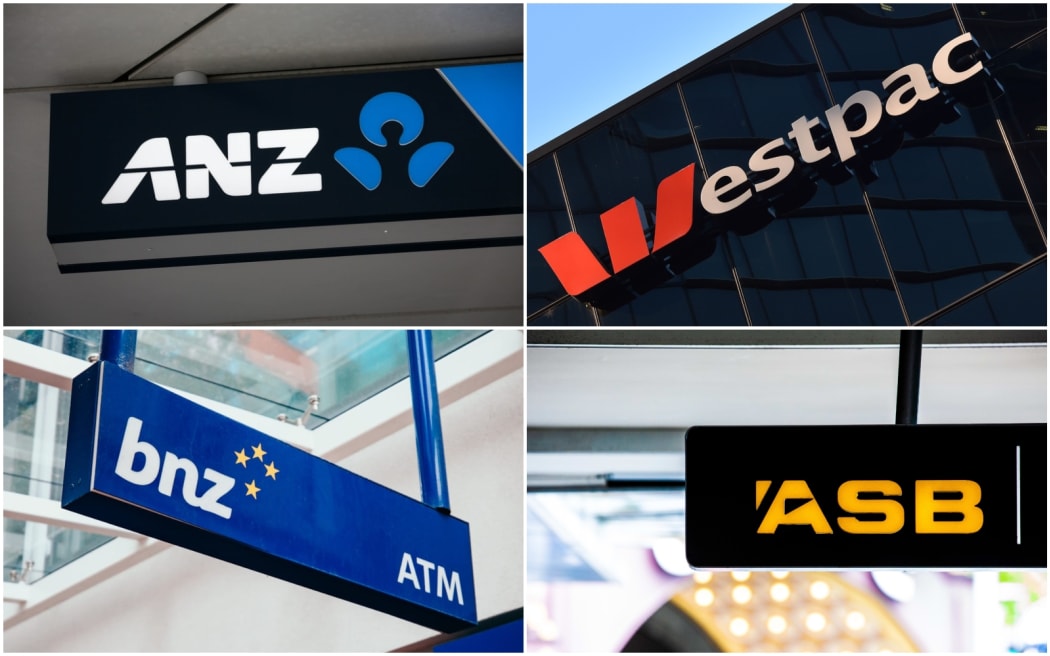
Four Australian banks in New Zealand made about $7 billion in profits in 2023. Photo: RNZ
Analysis - The Commerce Commission's banking market study has concluded more competition is required to reduce the profits of the big four banks. But the report suggests increasing competition may be ineffective unless customers are easily able and willing to switch between banks.
In 2023, the four Australian banks operating in New Zealand made approximately NZ$7.1 billion in profit, representing $1400 per person. Despite many customers struggling due to increasing mortgage costs, the banks' profits rose.
The previous government commissioned the market study to look into whether competition for personal banking services in New Zealand was working.
The report highlights a lack of true competition, with Kiwibank under-capitalised and the slow rollout of open banking.
Though open banking is on the horizon, it may also prove less than effective unless we can demystify the financial system and make switching less costly and less time-consuming.
News about #NZ | New Zealand's government promised a shake-up of consumer banking after the country's watchdog said the sector lacked competition and suggested improvements including looking at ways to increase state-owned Kiwibank's capital: https://t.co/nG06yQTINo
— CSIS Southeast Asia (@SoutheastAsiaDC) August 20, 2024
The hurdles to changing banks
One barrier to competition is consumer disengagement. This results in many people staying with their bank despite being charged more than those shopping around. The commission's report notes 54 percent of customers have never switched banks.
The report identifies several issues that result in customers being "sticky" and disinclined to switch banks, including how difficult it can be to find the best deal.
For example, the advertised mortgage interest rate can differ from the rate you are ultimately offered. Customers must go through the mortgage application process to get a definitive rate. This is a time-consuming process that limits their incentive to shop around.
Additionally, switching banks can become a long and onerous task involving changes to automatic payments, and notifying your employer and every organisation you have financial interactions with.
The experience of KiwiSaver also raises questions about the effectiveness of competition. With over 20 providers in New Zealand, the KiwiSaver market appears competitive.
However, a 2019 report commissioned by the Financial Markets Authority concluded that, compared to similar funds in the United Kingdom, KiwiSaver fund fees were between a third and 80 percent higher.
Additionally, economies of scale do not appear to have been passed on to customers. Consumers' unwillingness to engage with their KiwiSaver, essentially a set-and-forget approach, has limited the price competition you would expect to see in a competitive market.
The promise and reality of open banking
Open banking allows access to banking and transaction data via third-party service providers. New Zealand has lagged behind other countries in establishing open banking systems.
Open banking allows users to aggregate multiple bank accounts within one app, and allows lenders to directly access a person's financial information. There is the potential for open banking apps to compare products and services from different banks using a person's own data, making shopping around considerably easier.
With the aggregation of services from different providers in a single app, a consumer could easily have their savings and transactions with different banks, selecting the "best" product for them.
While open banking has huge potential, it will again depend on the consumer to realise this potential. Willingness to accept the third-party apps and to allow them access to personal data will be critical, at least once the infrastructure is in place.
The ongoing disengagement of many consumers to all things financial means even open banking may not improve competition in the banking sector.
Today from The Detail: Fast, efficient and secure open banking is nearly upon us – and it's not as scary as you might think. https://t.co/K626qHUP5v
— Newsroom (@NewsroomNZ) August 20, 2024
Greater transparency
If the government wants to address bank profitability, it needs to enable and encourage people to change banks. So, how can this be achieved?
Firstly, information needs to be more clearly available and understandable. Advertised mortgage rates and cash back incentives, for example, are often less attractive than the rate offered at the end of the application process.
But a prospective client is unable to find that out until they have invested time and effort applying.
Secondly, the government needs to make the process of changing banks easier. Some countries have implemented systems to reduce the time and pain associated with switching accounts, such as Australia's New Payments Program or the UK's Current Account Switch Service.
Finally, the government needs to accelerate the adoption of open banking. This will allow consumers to centralise their financial data and to apply for different banks' products (such as savings, credit cards and mortgages) from a single platform.
* Aaron Gilbert is a professor of finance at Auckland University of Technology.




